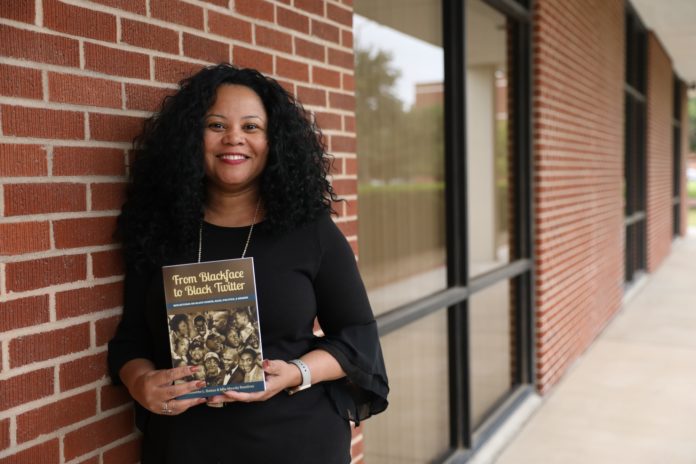
By Lizzie Thomas | Staff Writer
How identities are represented in the media and entertainment industry has been a subject of study for some time, but one Baylor professor explored how it’s changing with social media.
Dr. Mia Moody-Ramirez, associate professor in the department of journalism, public relations and new media, as well as graduate studies director and director of American Studies, released her book in September, “Blackface to Black Twitter: Reflections on Black Humor, Race, Politics and Gender” about the roots and fruits of comedy which is by, for and about black people.
“Black comedy, the authors suggest, is often an Afrocentric response to white hegemony and the insidious stereotyping of blacks by others,” said DeWayne Wickham, dean and professor of journalism in the School of Global Journalism and Communication at Morgan State University. “More than anything else, this book is about how the laughter created by black comics has been a key part of the existentialism of America’s black community.”
The book, which is the second she has co-authored with former dean emerita of the School of Communications at Howard University Jannette Lake Dates, looks at the influence of social media on comedy and perceptions. It traces the ways in which social media has changed who writes and consumes black comedy. With social media, anyone can have an audience; and audiences are no longer limited to existing groups, but are open to the world.
The book examines comedy over the centuries, analyzes and offers insights into the intersections of race, gender and politics in humor.
“I’ve always enjoyed researching and writing about gender,” Moody-Ramirez said. “Previous studies have emphasized representation of women and people of color on traditional media platforms such as TV and newspapers. I’ve been able to extend those studies to social media platforms.
Moody-Ramirez said it is more important now than ever to extend academic exploration of relevant new areas within the discipline of mass media communication, such as perceptions of different aspects of identity in social media because of the current sociopolitical climate.
“There is something newsworthy to write about everyday. It is my goal to help document,” Moody-Ramirez said.
Moody-Ramirez encourages all students to read her book and take her class, JOU 4305: Gender, Race & Media.
“I love sharing my research with students and encouraging them to write about similar topics,” Moody-Ramirez said. “Former students have also written about the topic. They have presented at conferences and had articles published as interns. I am very proud of the work that they are doing. It is my hope that my legacy is to have students continue to research these topics gone after I am gone.”
Houston senior Paulina Agyei, a sociology major, said sociology (which intersects with Moody-Ramirez’s analysis of media and communication) is retrospective, and this explains why academia is beginning to see the patterns and phenomena in social media. According to Agyei, the complications of a layered history of context get murky when the internet is added to the mix.
“[Before social media], specific interpretations of things would stay in their own area,” Agyei said. “Definitions of blackness were confined to a region. With the internet, the world is smaller, and we’re just parsing through that now.”
According to Moody-Ramirez, feedback on the book has been positive. She said it has been a lifelong goal to write books.
“Even as a teenager, I knew I wanted to be a book author. The importance of writing about gender and race developed over the years, first as a consumer, then student, now professor,” Moody-Ramirez said.
Henry Louis Gates, Jr., Alphonse Fletcher University professor and director of the Hutchins Center for African and African American Research at Harvard University, reviewed the book, stressing its important contribution to the field.
p.p1 {margin: 0.0px 0.0px 0.0px 0.0px; text-align: justify; text-indent: 12.0px; font: 9.0px ‘Minion Pro’}
“In this important addition to the literature concerning black humor, Jannette L. Dates and Mia Moody-Ramirez provide a wide-ranging and comprehensive overview of comedy by, for and about African Americans,” Gates said. “For newcomers to the field, the appendices will be a welcome guide, as will the historical scope offered by this volume. The major contribution of this book is in the authors’ very timely and important explication of the impact of new social media platforms on the deployment of black humor in the early 21st century, by both professional comedians and by the general public.”





